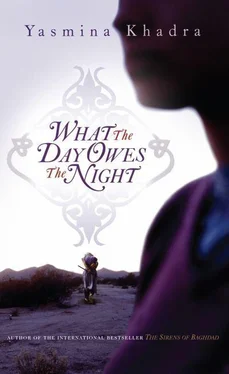The four of us who made up Jean-Christophe’s gang turned a blind eye to what was happening in these demonstrations. We were young men now, and if the down on our upper lips was not yet thick enough to qualify as a moustache, it emphasised our desire to be men, to be masters of our fate. The four of us, inseparable as the tines of a pitchfork, lived for ourselves; we were our own little world.
Fabrice was awarded the National Poetry Prize, and Madame Scamaroni drove all of us to Algiers for the ceremony. Fabrice was overjoyed. Aside from the prestige, the winning collection of poems was to be published by Edmond Charlot, an important Algerian publisher. Madame Scamaroni put us up in a charming little hotel not far from the Rue d’Isly. After the ceremony, at which Fabrice received his award from the great poet Max-Pol Fouchet, the prizewinner’s mother treated us to a lavish seafood dinner at a magnificent restaurant in La Madrague. The next day, eager to get back to Río Salado, where the mayor had organised a lunch to honour the town’s prodigy, we set off early, stopping at Orléansville for a snack and at Perrigault to stock up on the finest oranges in the world.
Some months later, Fabrice invited us to a bookshop in Lourmel, a small colonial town near Río Salado. His mother was there, looking stunning in a burgundy trouser suit and wearing a broad-brimmed feathered hat. Smiling benevolently, the bookseller and a number of local dignitaries stood around a large ebony table on which sat piles of books fresh out of their boxes. On the cover, beneath the title, was the name ‘Fabrice Scamaroni’.
‘Holy shit!’ sputtered Simon, who could always be counted on to undermine any solemn occasion.
The moment the speeches were over, Simon, Jean-Christophe and I pounced on the books. We leafed through the pages, turning the books over in our hands, so reverential that Madame Scamaroni was surprised to find a tear that trickled mascara down her cheek.
‘I read your work with great pleasure, Monsieur Scamaroni,’ a man of about sixty said to Fabrice. ‘You have considerable talent and, I think, every chance of reviving the noble art of poetry, which has always been the soul of Algeria.’
The bookseller handed Fabrice a letter of congratulations from Gabriel Audisio, founder of the magazine Rivages, in which the editor suggested that they might collaborate.
Back in Río Salado, the mayor promised to open a library on the main street, and Pépé Rucillio bought a hundred copies of Fabrice’s poems to send to his acquaintances in Oran – who, he suspected, called him an upstart peasant behind his back – to prove to them that there was more to Río Salado than idiots, wine growers and drunks.
Winter tiptoed away one night, and by morning, swallows dotted the telegraph lines like ink blots and the streets of Río Salado were awash with the scents of spring. My uncle was slowly returning to life. He had recovered his health, his old habits, his passion for books; he devoured them, closing a novel only to open an essay. He read in both French and Arabic, moving from El Akkad to Flaubert. Though he still did not venture out of the house, he had begun to shave and dress every day. He now ate with us in the dining room and occasionally exchanged pleasantries with Germaine. As regular as clockwork, he would get up at dawn, perform his morning prayers and appear at the table for breakfast at seven o’clock sharp. After breakfast, he would retire to his study to wait for the newspaper to be delivered, and when he had read the paper, he would open his spiral notepad, dip his pen into the inkwell and write until noon. At one p.m. he would take a short nap, and then pick up a book and lose himself in its pages until sundown.
One day, he came to my bedroom.
‘You need to read this. It was written by Malek Bennabi. The man himself seems a little suspicious, but he is a clear thinker.’
He set the book down on my night table and waited for me to pick it up. It was a slim volume, barely a hundred pages, entitled The Conditions of the Algerian Renaissance.
As he left the room, he said:
‘Never forget what it says in the Qur’an: Whosoever killeth a man, it shall be as if he had killed all mankind.’
He never asked me whether I had read Malek Bennabi’s book, still less what I thought of it. At dinner he only ever spoke to Germaine.
Our lives had recovered some semblance of stability. Things were far from being back to normal, but just seeing my uncle standing in front of the wardrobe mirror knotting his tie was wonderful. Germaine and I waited anxiously for him to cross the threshold, to step outside and rejoin the world of the living. Germaine would throw the French windows open so he could adjust to the sounds of the street again. She dreamed of seeing her husband adjust his fez, smooth his jacket, glance at his fob watch and hurry out to visit a café, to sit on a park bench, to be with friends. But my uncle dreaded the outside world, he had a morbid fear of crowds, he panicked if someone crossed his path. Only at home did he truly feel safe.
Germaine believed that her husband was capable of the superhuman effort it would take to rebuild his life.
Then, one Sunday as we were finishing lunch, my uncle suddenly banged his fists on the table, sending plates and glasses crashing to the floor. We thought it might be another heart attack, but it was not. He leapt to his feet, knocking over his chair, then shrank back to the wall, pointing at us, and thundered:
‘You have no right to judge me!’
Germaine stared at me in astonishment.
‘What did you say to him?’
‘Nothing . . .’
She looked at her husband as though he were a stranger.
‘No one is judging you, Mahi.’
But my uncle was not talking to us. Though he was staring straight at us, he could not see us. He frowned as though shaking off a bad dream, then he picked up his chair, sat down again, took his head in his hands and did not move.
That night, at about three a.m., Germaine and I were woken by the sound of raised voices. My uncle had locked himself in his study, where he was arguing violently with someone. I dashed downstairs to see if the front door was open, but it was locked and bolted. I went back upstairs. Germaine tried peering through the keyhole to see what was going on, but the key was in the lock.
‘I am not a coward,’ my uncle screamed hysterically. ‘I didn’t betray anyone, do you hear? Don’t look at me like that. How dare you sneer at me. I never informed on anyone . . .’
Then the study door flew open and my uncle emerged, raging, his lips flecked with foam, and pushed past without even seeing us.
Germaine was first to go into the study; I followed her. There was no one there.
Early in the autumn, I saw Madame Cazenave again. It was raining hard, Río Salado was gloomy and dismal, the café terraces were deserted. Seeing her come towards me, I realised that she still had the same ethereal beauty, but my heart did not leap in my chest. Did the rain temper my passion, the dreary weather blunt my memories? I did not care to wonder. I crossed the road to avoid her.
In Río Salado, which drew its vital force from the sun, autumn was always a dead season. In autumn, the masks that people wore in summer fell away like the leaves from the trees and, as Jean-Christophe Lamy discovered, deathless loves took on a sudden brittleness. One evening Jean-Christophe arrived at Fabrice’s house, where we were waiting for Simon to come back from Oran. He did not say a word; he simply sat on the veranda and brooded.
Simon Benyamin had gone to Oran to try his luck as a comedian. He had seen an ad in the paper looking for talented young comedians and thought this was his chance. Stuffing the ad in his pocket, he hopped on the first bus, bound for glory. From his expression when he arrived back, it was clear things had not gone as he had hoped.
Читать дальше












